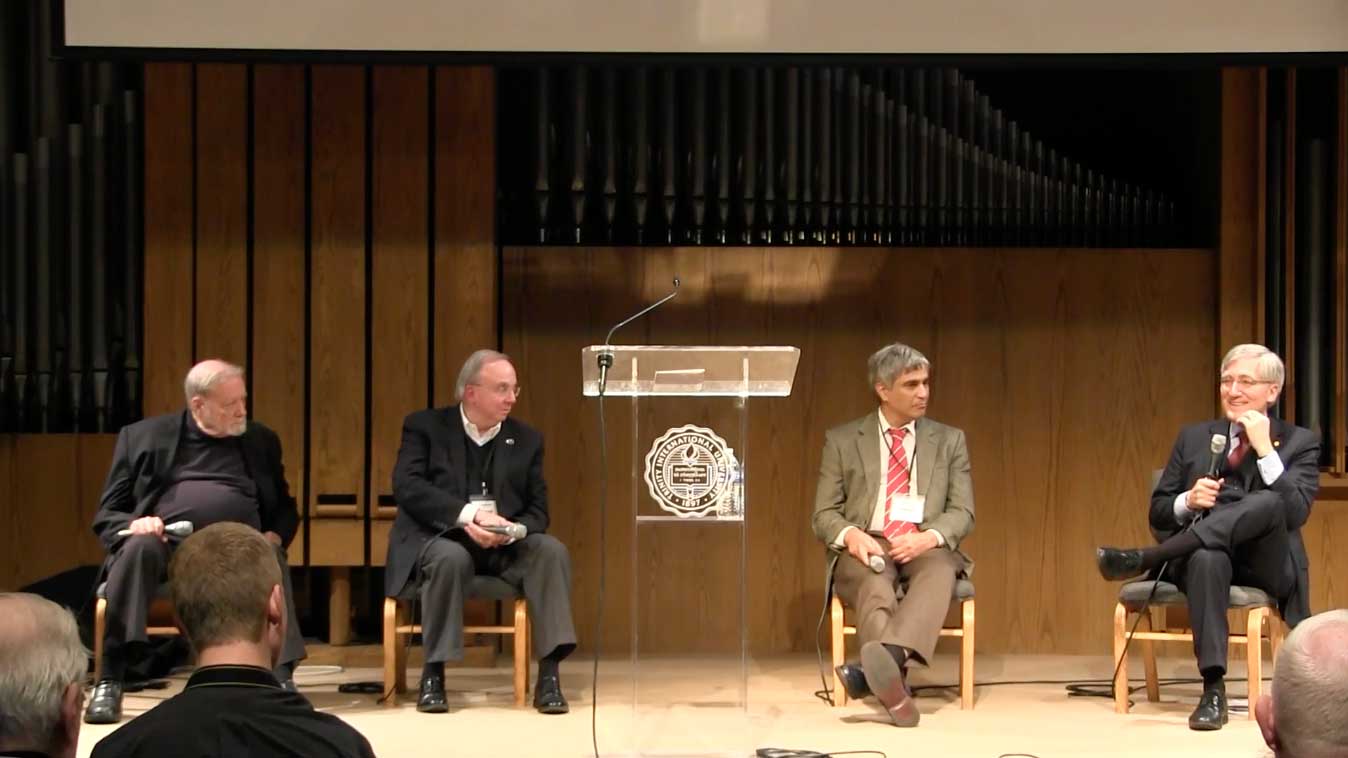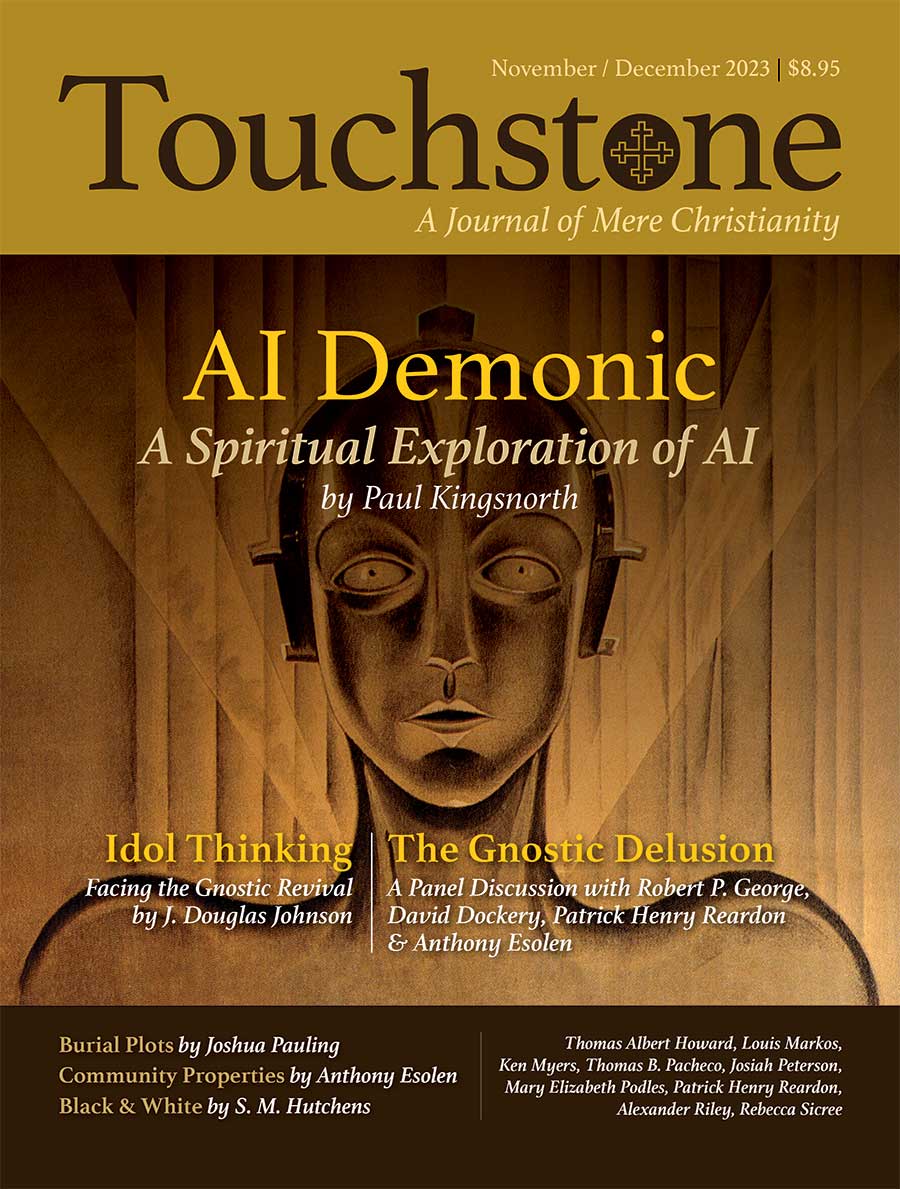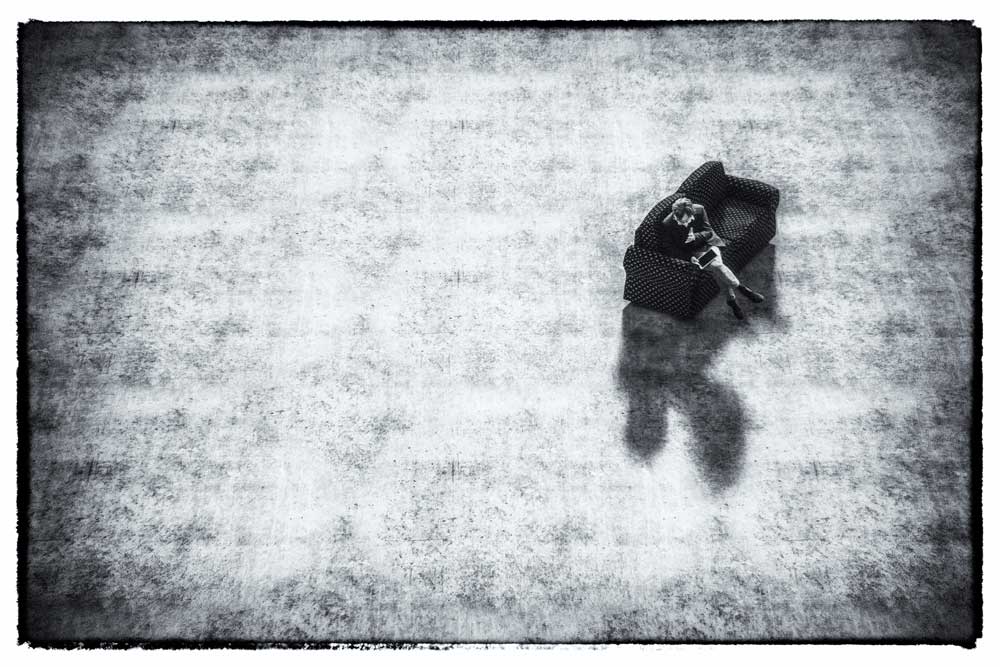The Gnostic Delusion
I have not read a single article or book that does a better job connecting the dots on everything from our seduction with AI and digital transhumanism, to marriage redefinition, to . . . (you name it), than Robert George managed to do in his 2016 Touchstone conference talk on “The Gnostic Revival.”
I encourage all our readers to listen to Dr. George’s presentation (available on our website), in which he emphasized the dualistic nature of Gnosticism, the heresy that holds that the body is a mere instrument of no particular worth and separate from the mind or soul. Following that talk, Touchstone senior editors Fr. Patrick Henry Reardon, Dr. Anthony Esolen, and Dr. David Dockery joined Dr. George onstage to discuss the implications of what they just heard. The following is a slightly edited transcript of that discussion.
—J. Douglas Johnson, Executive Editor
David Dockery:
I want to raise the first question, Dr. George, in light of what was almost a passing comment in your wonderful presentation, the recognition that current liberal thought has adopted this body-soul distinction, this neo-gnostic view. Unfortunately, it seems to me it also has crept into portions of the Church in all of its traditions. And you see it in current conversations about religious liberty. You made a passing comment about the physician or the surgeon who may not have a choice in this matter and whose religious liberty would be violated. We hear an awful lot today about SOGI laws (sexual orientation and gender identity laws) and how religious liberty and SOGI laws can coexist together. So in light of what you have shared with us so beautifully this evening, might you take it to the application stage for us, on the implications for religious liberty?
Robert George:
I am very skeptical of these SOGI laws. First of all, the religious liberty guarantees will not hold. What happens is that a deal is struck, usually not a very good deal. At most, as in Utah, some religious liberty interests of the Church are protected. In that case, the liberty interests of the LDS Church, the Latter-Day Saints Church, are protected, but not the interests of the faithful—not the photographers, or the florists, or the doctors or nurses in the case of abortion, or what have you.
When discrimination based on sex is now taken to mean a protection of abortion, so-called abortion rights, it’s not only that the religious liberty interests, meager as they are, are eroded. Because once the other side has gotten what it wants, which is the SOGI protections, it can turn all its attention and resources into undoing what it gave up to get that deal.
We ought not to buy into the concepts of sexual orientation and gender identity in the Church itself. That’s a big problem. Do you want your faithful believing that they have something that your grandfather didn’t know he had? Did your grandfather know he had a sexual orientation? Probably not. He was right. He didn’t.
This self-identifying on the basis of sexual inclination, sexual desire, homoerotic activity, homoerotic relationships—this is known to history. Well known all the way back. But the idea of sexual orientation, much less gender identity—which your grandfather didn’t know about either—that is a modern invention. That’s an invention of nineteenth-century psychology.
I’ve told you about different ways I have fun with my colleagues. Sometimes I ask them, “This thing’s for real? Sexual orientation, that’s for real, right?” “Oh, yes. Absolutely exists.” “I mean, it’s a mistake to say it doesn’t exist.” “Oh, yeah, it’s a mistake to say it doesn’t exist.” “It’s real because it’s a matter of scientific fact, right?” “Oh, it’s a matter of scientific fact!”
Then I say, “When was it discovered? . . . Oh, I mean it was discovered, wasn’t it? . . . Oh, and by the way, who discovered it? . . . I can tell you who discovered lots of things—you know, the famous scientists; we’ve got school kids who can tell you who discovered this and who discovered that; who’s the guy who discovered sexual orientation? You know, we don’t find sexual orientation in the classical tradition; we don’t find it in the medieval tradition; we don’t find it in the Renaissance—who’s the discoverer?”
Wasn’t discovered. If there’s such a thing as something being socially constructed, that’s it! And it was socially constructed—not by a society; it wasn’t actually socially constructed unless you consider the “society” of American psychologists or something like that to be the social constructors.
And of course, it has very bad consequences at the pastoral level in enabling Christians who do experience, for example, same-sex desire or gender dysphoria, who have the subjective feeling—which as a matter of feeling, is a reality—they really do have the feeling of being a woman trapped in a man’s body or a man trapped in a woman’s body. The pastoral care of such precious persons—who do deserve our care; they should absolutely never be ridiculed or mistreated in any way. These are our brothers and sisters, and they need our help. But they need to be told the truth. And it’s not telling them the truth to say that, “well, your gender identity is female, although your sex is male.” And once the Church buys into this, the problem for the pastors is almost insurmountable.
The kid comes home to the parents and says, “Mom and Dad, I’m, you know, I’m gay. I’m in this category; I’m falling into this sexual orientation; I’m gay.” And the mom and dad, good Christian people, what are they going to do? They’re going to go to the pastor! And they say, “Billy says he’s gay.”
Now, what’s the pastor supposed to say? I mean, if the presumption is going to be, well, this is just a fact about Billy, that he’s got this kind of sexual orientation, and he’s got the whole culture telling him that to be himself means to live as who he is, where sexual orientation is a matter of your identity.
So we’ve got to think ahead a couple of moves. When you buy into those laws, thinking you’re going to get a compromise, thinking you’re going to get some protections for your church, what are you buying into that’s going to come back to haunt you in the actual life of the church and in the pastoring of the faithful?
Anthony Esolen:
When a person says, “I feel that I am a woman trapped in a man’s body,” he’s referring to, or he intends to refer to, something objective. Maybe it’s something like this: “I presume that I have the feelings that would be proper to somebody who had a female body, but I happen to have a male body.” So if that’s what he means, he’s assuming that there really are these creatures out there called women who are integrated body-affective and biological unions. He happens to be the weird exception, but they do really exist.
But that would seem to undermine the whole point of everything. What exactly do your colleagues think a person is in reality referring to when they say, “This person here feels that he is a woman in a man’s body”? What can that possibly mean?
Robert George:
That is such a good and devastating question. It’s virtually a rhetorical question because you know that they’re not going to have an answer for it. I will take that back to my colleagues and put that question to them. And since you’re probably not going to be around when I do, I’m not going to credit you with the question! I’m going to pretend I’m really smart. [Laughter.] But you all see the point? I mean right there! Devastating.
Anthony Esolen:
I thought they would have come up with something.
Robert George:
No, you don’t need to when you have cultural power. Cultural power will cover a multitude of sins of not having good arguments.
Question from the Audience:
I wonder if there is an objective perspective somewhere. Maybe this is a propositional question: Has theological scholarship ever analyzed this Gnosticism as an ideological conception of the Evil One, of Satan himself, with the idea of understanding better the Evil One’s agenda and objective purpose in fomenting this peculiar ideology?
Robert George:
If the answer to that is yes, my guess is that it would be found in the Church Fathers. So, Father Pat, this one is for you.
Patrick Henry Reardon:
That is the case. This is the view of Irenaeus and other opponents of dualism such as Tertullian.
Question from the Audience (con’t):
Do we have some sense of understanding of the Evil One that results from this assertion? In other words, has it been explored objectively to try to understand what, for example, might be the Evil One’s purpose? To dissemble and to deface the image of God in man as male and female? In other words, to remove the icon of the Creator uniquely in man from the entire view of the cosmos?
Patrick Henry Reardon:
Oh, yes! I think of Irenaeus, especially in A Treatise Against the Heresies. He goes to Christ. He speaks of Christ as the vivens homo, the living man, whom he identifies as the gloria Dei. Vivens homo as gloria Dei. He goes to Christ as the human being, as the icon in whom all other human beings are formed.
Look at the Creed. What’s the first thing we believe in the Creed? “I believe in God, the Father Almighty, Creator.” Creator. The doctrine of creation, which we got from the Jews, was the major place where the Christian Church was challenged for the first 300 years. The major place, the assertion of creation. And I see that right now. We sort of got rid of creation in the mid-nineteenth century. What was it, 1858—something like that? We got rid of the doctrine of creation. We substituted something else for it. This is part and parcel of this whole mythology of this thing all evolving from nothing or from lower beings and so forth.
These things are all tied together. We didn’t hear much about creation tonight because that wasn’t the point of focus. But everything Dr. George said could be put within that mold. The assertion of creation. God as the Creator. And he creates according to Christ. St. John calls Christ the Logos; St. Paul calls him the eikōn tou Theou tou aoratou, the icon of the invisible God. Both of those things have to do with creation.
Anthony Esolen:
I would just add that the great Christian poets have understood this. So when C. S. Lewis in The Screwtape Letters has his demon, Screwtape, express with great gusto his detestation of the physicality of man, this is not something new in Lewis. He’s picked it up from the Fathers, but also from the poets he’d been reading.
I think particularly in this case of Torquato Tasso, whose Satan says—and he hates it—he says, “It’s bad enough that we angels have been sent down to hell, but ‘man the vile, born of vile mud, he invites / to rise instead to those celestial heights.’” And Milton picked up on it in Paradise Lost—the emphasis on how degrading it is for God even to associate himself with mere physicality. Milton picked up on that. And when Satan infuses his consciousness into the body of a serpent in Paradise Lost, Book Nine, it’s a serpent that he’s basically using as a robot.
This really is self-body dualism. It’s Satan inside the snake, manipulating it. He expresses his disgust: “O foul descent! that I, who erst contended / With gods to sit the highest, am now constrained / Into a beast; and, mixed with bestial slime / This [angelic] essence to incarnate and imbrute. . . .” How disgusting it is that I have to be associated even in a contiguous way with physicality! But that’s what ambition has to stoop to here. So Milton picked that up from the earlier poets, but it’s all through the poets.
Robert George:
I am definitely not a theologian, and so I beg David and Father Pat to correct me if what I’m about to say is wrong in any way or contrary to faith. But it seems to me, if my job were to lead people astray, lead people down the wrong path to destroy them, teaching them to have contempt for themselves would be a pretty good proximate goal.
And I would take advantage of the fact that having a body is a problem. You’ve got to feed it; you’ve got to care for it. It gets dirty; it gets smelly. You have to get rid of waste, nasty stuff. It gets sick. We have pain. What is there to like about that? That can’t be the real you, I would tempt people to think; that can’t be you. I mean, the real you is the stuff that doesn’t smell and doesn’t need to be taken care of and doesn’t need to be fed and doesn’t have all the drawbacks of the body. So let’s just look at the contemporary phenomenon instead of going back to the second century and Irenaeus and his response to the Gnostic heretics. Let’s look forward with the transhumanists.
Everybody heard of transhumanism? One of the big goals of transhumanism is to be able to upload the content of our minds into a computer. Why is that attractive?! Because it promises all the stuff you want, which is experiential, without all the other stuff, all the stuff that you have to use as means to get the experiences. Even in the area of sex, say orgasms, you’ve got to manipulate the body to get one. What if you could have them without having to manipulate the body? By the way, it would never fail! You can induce these experiences in the psyche because now you’re a pure, unembodied consciousness, a psyche that can spend all day, every day just having desirable experiences.
Question from James Kushiner:
How important is the dogma of the Incarnation to this question? Do we need to re-teach the Incarnation as the thing that completely devastates this? God himself took a body, took flesh . . .
Robert George:
. . . in order to be a human, in order to become human.
James Kushiner:
Yes.
Robert George:
So I’m going to jump at this, and again, Father Pat and David can correct me because it’s a theological matter, but let me take the first shot at it. Everything you just said is true, Jim, and it seems to me pretty decisive. I mean, if Jesus could have been a man without taking on flesh, why go to all the bother of taking on flesh? If he could have been like us in all things but sin without the flesh, why take on the flesh?
Now look at it from the other perspective. Our forebears, the early Christians, went to the mat for the doctrine of the resurrection of the body! Christ’s body and our bodies! I mean, they made things extremely hard on themselves! And dangerous! It would have been so much easier, so much safer, to say, “No, no, no. Jesus’ corpse wasn’t resuscitated. When we say he is resurrected, we mean he’s with us in spirit. He’s with us in spirit so that we will live on as spirits.” Why did Christians go to the mat, take all the risks, bear all the burdens, sound crazy, for the doctrine of the resurrection of the body? It has to be that to be a human person in its true and natural state is to be embodied. The body’s got to be part of the personal reality of the human being, and not a mere sub-personal instrument of the human being. Or so it seems to me.
Patrick Henry Reardon:
Chapter 17 of Acts. They want to hear anything new. Paul comes out with this thing they really do believe. When he says anastasis, he really does mean a resurrection and not the name of some goddess. At this point, they write him off. They want anything new, but not that!
Question from the Audience:
Dr. George, you mentioned, I think, at the beginning that the secularists, the Gnostics, think that we’re the dualists and they don’t understand why we would think that about them. But I wonder if they don’t think they’re dualist because they do believe in this real self of feelings, but their underlying belief is in eliminative materialism. And so the real self is nothing but chemistry. And they prove that by the fact that we become dust after we die. And so I think that’s their underlying belief. Which I think means that the actual radical statement is not the resurrection of the body, but the resurrection of the body.
Robert George:
I’m grateful for your question for a lot of reasons. It’s an excellent question, and one of the reasons is that it gives me an opportunity to do a commercial advertisement for my book with my colleague Patrick Lee, from Cambridge University Press, called Body-Self Dualism in Contemporary Ethics and Politics. And we devote much of a chapter to trying to show that those of our liberal, expressive, individualist friends who are philosophers and know how to make fancy arguments can’t escape their dualism simply by invoking their materialism, their eliminative materialism. Of course, that’s the move they want to make. They want to say, “I don’t want to be a dualist! I don’t think there’s any soul or spirit at all!”
Well, you should be consistent with that then. And if you are consistent with that, you’re pretty soon going to be explaining away even consciousness itself as, of course, illusory. At the end of the day, they introduce or reintroduce, as a practical matter, that superiority of the mental over the material—that it’s truly the mental that matters. If we could upload [ourselves] into the computer, we would still be us even though we wouldn’t be bodily anymore. We would just be living in a virtual state.
It’s sometimes possible to be a critic and even a sound critic of a view. Now, I don’t think that there is a sound criticism of the anti-materialist view. But even if there were, it’s possible to be a sound critic of a view and still fall into it as a practical matter. No matter how good your critique of it is, as a practical matter, you may be falling into it and relying on it for other aspects of your argument.
So these eliminative materialists, it turns out, have strong ethical views that they’re willing to defend and go to the mat for. Now what do those ethical views presuppose? It turns out, not eliminative materialism! It’s something else. And that’s where the practical dualism creeps in. And here we’re only talking about the philosophically sophisticated. For the kinds of ordinary liberals who write emails that wiki then leaks, embarrassing you with your statements about religion—they are straightforwardly dualistic. They don’t even have some fancy philosophical effort to escape it.
Patrick Henry Reardon:
May I take it in a somewhat different direction? I’ve been very struck . . . We got our doctrine of the Resurrection, of course, from the fact of the Resurrection. From the fact of the Resurrection. But Judaism was expecting a resurrection. You can see that in Second Maccabees. Josephus, when he comes to describe the Pharisees (the Hellenic Jewish ones), he’s trying to make the Pharisees intelligible as a school of thought to his pagan readers. What is he going to do with the Pharisaic belief in the resurrection? He avoids it! He changes resurrection to “transmigration of souls.”
Robert George:
So it’s a sort of Neoplatonism?
Patrick Henry Reardon:
Exactly! Well, a pre-neo, but it’s a form of Platonism. He changes even the Pharisaic belief that there will be a resurrection. He changes it into something that the pagan can understand, that any reader of the Phaedo could understand, that the soul goes and may come back again.
Robert George:
Interesting. Wow.
Question from the Audience:
This question is directed to Dr. George. I think it was in the State of the Union address this year [2016] where our President [Obama] addressed transgenderism and became the first one, I think, to do that. As we see the president and other politicians advancing this philosophy, how are we to understand the state’s power to shape and influence the culture in terms of these ideologies? Do they have that much power, or is it simply the culture that they’re now becoming mouthpieces for? And how might we as Christians respond to them, either as a threat or—how can we see what we’re dealing with in our relationship to them?
Robert George:
The late and very great liberal political philosopher, Harvard philosopher, John Rawls made it his life’s project to try to devise what he called a purely political liberalism. He distinguished political from metaphysical. What he aspired to was a liberalism that was consistent with the range of reasonable, comprehensive visions, worldviews, religions, great philosophies—consistent with them all—and that did not compete with or seek to displace any of them, but rather fashioned what he called an overlapping consensus, where norms of public life, government, law, could be embraced for their own reasons by members of the various comprehensive doctrines, religious or secular—utilitarianism, Judaism, Libertarianism, Catholicism, Christianity perhaps more broadly, what have you.
He wanted to avoid the idea of liberalism or progressivism as a comprehensive doctrine, as a competitor—in part because he recognized that such a thing would be totalizing. It would then essentially seek to function as a state religion, one that pertained to all aspects of life, further intruding into what, from the point of view of historic American civic principles, was private life, or familial life, or what Tocqueville called the institutions of civil society. And what we see—although Rawls is as celebrated a philosopher as you can find among secular progressives—what we see is the failure, the utter failure of Rawls’s project, because contemporary secular progressivism is a comprehensive view—exactly what he didn’t want it to be.
It is a totalizing doctrine that seeks to establish itself as a state religion. If you wonder what the President of the United States is doing talking about transgenderism, there’s your answer.
It pretends to be a purely political doctrine, a doctrine of public reason—what Rawls called public reason. But it is nothing of the kind. In fact, the political doctrines of the religions, the historic faiths, especially Christianity, are far less totalizing, leaving much more room for the life of the institutions of civil society than secular progressive dogma leaves.
Again, it’s important to take the measure of what we’re up against now. We’re up against a view that is trying to establish itself and function—and has made great progress toward it—as a state religion. We’re back in Rome.
Robert P. George is McCormick Professor of Jurisprudence and Director of the James Madison Program in American Ideals and Institutions at Princeton University (web.princeton.edu/sites/jmadison). His books include In Defense of Natural Law (Oxford University Press) and Conscience and Its Enemies (ISI Books). He has served as chairman of the U.S. Commission on International Religious Freedom. He is a senior editor of Touchstone.
subscription options
Order
Print/Online Subscription

Get six issues (one year) of Touchstone PLUS full online access including pdf downloads for only $39.95. That's only $3.34 per month!
Order
Online Only
Subscription

Get a one-year full-access subscription to the Touchstone online archives for only $19.95. That's only $1.66 per month!
bulk subscriptions
Order Touchstone subscriptions in bulk and save $10 per sub! Each subscription includes 6 issues of Touchstone plus full online access to touchstonemag.com—including archives, videos, and pdf downloads of recent issues for only $29.95 each! Great for churches or study groups.
Transactions will be processed on a secure server.
more on Culture from the online archives
more from the online archives
calling all readers
Please Donate
"There are magazines worth reading but few worth saving . . . Touchstone is just such a magazine."
—Alice von Hildebrand
"Here we do not concede one square millimeter of territory to falsehood, folly, contemporary sentimentality, or fashion. We speak the truth, and let God be our judge. . . . Touchstone is the one committedly Christian conservative journal."
—Anthony Esolen, Touchstone senior editor













